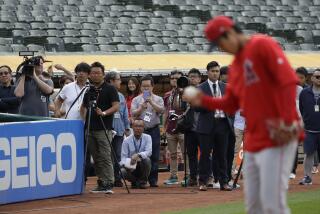The Pacific : U.S., Japanese Press Far Apart on Covering Trade Issues
- Share via
Media coverage of U.S.-Japanese trade issues in both nations is often neither objective nor sufficiently informative, according to a recent study of the opinions of a group of U.S. journalists and business executives and their Japanese counterparts.
Significantly, the study found that the Japanese and American press do not give equal importance to the same issues. The Japanese journalists expressed more interest in writing about dollar-yen rate changes because they perceived those changes as directly affecting jobs. American journalists perceived Japanese-American competition in technology to be more important to American jobs and pride and tended to write more about such issues, as well as Japanese investments in the United States and the problems Americans have in investing in Japan.
The study was conducted by New York-based Rubenstein, Wolfson & Co. in cooperation with the University of Georgia’s Center for International Mass Communication Training and Research. Rubenstein Wolfson is a corporate and financial public relations and marketing communications concern. Some 71 American and Japanese journalists with experience covering U.S.-Japanese relations and 67 executives of large, multinational Japanese and U.S. companies were interviewed for the study.
Reflects Attitudes
Most Japanese journalists gave American journalists credit for lack of biases, but they and the business executives complained of serious deficiencies among American reporters in understanding the Japanese language and culture. The gap in understanding between Americans and Japanese was an important finding of the survey, said John W. English, a University of Georgia journalism professor who helped with the study. “They tend to understand us better than we understand them. Thus, their coverage of us tends to be better than our coverage of them.”
The study sought to learn more about how well Japanese and Americans communicate on business issues and to examine the relationship of communications to an apparent hardening of opinions here and in Japan on U.S.-Japan trade issues. “To some degree, we believe, this reflects and affects attitudes within the media and corporate communities,” the study’s authors said.
The Japanese appear to have concluded that Americans are simply interested in “Japan bashing,” said Harold Wolfson, a principal of Rubenstein Wolfson. American opinion seems to lean toward the attitude that the only way to get the Japanese’s attention on trade issues is “to hit them over the head with a 2-by-4,” he added.
Significant numbers of both groups of journalists and executives said more objectivity is needed in reporting on trade issues. “A portion of the U.S. press still has a Pearl Harbor mentality,” one American executive said.
Two-thirds of the American press representatives said the U.S. press is either “pro-U.S.” or “anti-Japanese.” Also, a third of the Japanese reporters said the Japanese press is biased in favor of Japan.
“It is an article of faith in Japan that the press must be ‘useful’ to the Japanese people. This concept, in practice, leads to short-sighted, one-dimensional reporting,” a Japanese reporter said.
Although only 3% of the American journalists thought the Japanese press was objective, the authors noted that half of the American reporters could not comment because they do not understand the language. “Very few Japanese would have to make that admission as a matter of fact,” said Rubenstein Wolfson’s Stephen Wechselblatt, who directed the study.
But the language barrier is only one part of the problem, according to the interviews. “The Japanese spend a great deal of time trying to understand our culture. We should make a significant commitment to understand theirs,” one American executive said. “Americans still don’t care if they understand Japan,” another American executive said. “The Japanese don’t want to understand America, but realize they must for pragmatic reasons.”
Participants in the study recommended special programs to train American journalists to cover Japan, the use of both Japanese and American sources in every significant story and joint ventures between American and Japanese wire services and other news organizations.
The interview subjects generally said the U.S. government was more timely, accurate, relevant and cooperative than the Japanese government, though some Japanese reporters complained of lack of access to U.S. political leaders. “Japanese government sources are usually polite, but they don’t give straightforward answers to straightforward questions,” an American journalist said. Of the Japanese executives interviewed, 40% said they never give information on U.S.-Japanese trade issues to American reporters. Also, 27% said they do not talk to the Japanese press. Only 9% of the American executives in Japan said they never talk to the Japanese media and 18% said they do not communicate with U.S. reporters.
“We do not release information for fear of being misinterpreted,” a Japanese executive said. An American executive said: “We tend to work through trade associations--notably the American Chamber of Commerce in Japan. This way no particular organization has to stick its neck out.”
More to Read
Sign up for Essential California
The most important California stories and recommendations in your inbox every morning.
You may occasionally receive promotional content from the Los Angeles Times.









